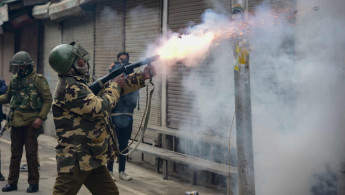Kashmir separatists rounded up following India's airstrike in Pakistan
Separatist leaders in Kashmir were targeted in raids by India's National Investigation Agency on Tuesday morning, as protesters took to the streets of Srinigar to throw stones at government facilities.
Yasin Malik and Mirwaiz Umar Farooq were among several whose homes were raided in the wake of India's airstrike against what it said was a training camp and base for the Jaish-e-Mohammed (JeM), which had claimed responsibility for the February 14 suicide attack which killed 49 Indian paramilitary soldiers.
At least 300 members of separatist groups have been detained in Indian-administered Kashmir in the past few days. Separatist leaders have called for a complete shutdown of businesses on Wednesday and Thursday.
Several deaths have also been reported in the Kotli district of Pakistan-administered Kashmir, amid heavy shelling across the Line of Control which divides Kashmir into two.
Sitting on shop fronts, inside government offices, private workplaces, shopping malls and seemingly everywhere else, Kashmir's people are discussing a potential war between Indian and Pakistan.
 |
Locals in Kashmir say peace must prevail between the two nuclear-armed countries. Any untoward happenings will lead to mutual destruction, they say |  |
"We were expecting that something unusual was going to happen. The situation was becoming exacerbated for the last few days," said Ghulam Rasool, a resident of Srinagar, the summer capital of Indian-administered Kashmir.
"The jets were hovering over our heads since the suicide attack."
Locals in Kashmir say peace must prevail between the two nuclear-armed countries. Any "untoward happenings" will lead to mutual destruction, they say.
"There is clearly a situation of widespread panic across the region, and despite reassurances from some quarters of the local government, the situation continues to be confusing and dangerous," said Omar Mohammad, a resident.
"The first casualty of any possible military escalation between the two countries is going to be people living across the borders, so this panic is not entirely without justification. Everyone is hoping for better sense to prevail in both capitals."
Hours after the aerial bombing, the first time India has launched a raid on Pakistan since the 1971 war, India's foreign secretary Vijay Gokhale said the fighter jets had targeted the Jaish-e-Mohammed (JeM) group, which he said was planning more attacks against Indian targets.
The Pakistan-based group had claimed responsibility for the 14 February suicide attack, carried out by 20-year-old Adil Ahmad Dar.
Terming Tuesday's bombing raid as "non-military, pre-emptive airstrikes", Gokhale said India had destroyed a training camp was run by JeM chief Masood Azhar's brother-in-law, Maulana Yousuf Azhar.
"The camp was targeted as it was far away from civilian settlements and no civilian casualty took place in the attack," Gokhale said.
"Despite the repeated advice from India, Pakistan was not taking any step to dismantle the infrastructure of terrorism on its soil."
Twitter Post
|
According to Indian reports, around 3.30am, 12 Mirage 2000 fighter jets crossed the Line of Control and dropped 1,000kg bombs on the camp at Balakot, about 10 miles into Pakistan's Khyber Pakhtunkhwa province over the border from Pakistan-administered Kashmir.
India claims the camp was the hub of suicide attack training. "Several terrorists, trainers and JeM commanders were killed," India's foreign ministry said.
During an election campaign stop in Churu, Rajasthan, Indian Prime Minister Narendra Modi told voters: "I assure you, the country is in safe hands."
"Today is a day to pay respect and homage to India's brave hearts," Modi said.
Political leaders of other Indian parties also took to Twitter to praise the Indian air force.
But Pakistan's armed forces rejected India's claim.
"Indian aircraft intrusion across LOC in Muzaffarabad Sector within AJ&K was 3-4 miles," said a spokesperson. "Under forced hasty withdrawal, aircrafts released payload which had a free fall in open area."
Twitter Post
|
"No infrastructure got hit, no casualties. Technical details and other important information to follow," he added.
Pakistan's Prime Minister Imran Khan vowed to take revenge.
Twitter Post
|
"India has committed uncalled-for aggression, to which Pakistan shall respond at the time and place of its choosing," Khan said.
"Once again, the Indian government has resorted to a self-serving, reckless and fictitious claim. The claimed area of the strike is open for the world to see the facts on the ground.
"The action has been done for domestic consumption in the election environment, putting regional peace and stability at grave risk," Khan said, referring to Indian elections to be held in May.
Reports suggest Khan has called another emergency meeting of parliament and the National Command Authority - the body that supervises the country's nuclear arsenal.
While Pakistan was weighing its response, people in Indian cities were celebrating the airstrike.
The tension between the two nations has been escalating since the Valentine's Day suicide attack.
After the attack, Modi told India: "The sacrifice of our brave security forces shall not go in vain."
Aamir Ali Bhat is a Kashmir-based freelance journalist who reports on human rights abuses, culture and the environment. He writes for The New Arab, Kashmir Ink and Free Press Kashmir.
Follow him on Twitter: @Aamirbhatt3



